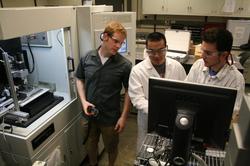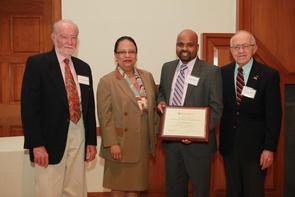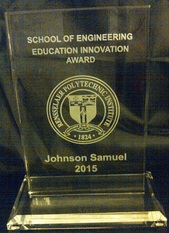Micro/Nano-Scale Manufacturing Education @ Rensselaer

The PI (Samuel), has received a three-year, Transforming Undergraduate Education in STEM (TUES) Phase-1 grant from the National Science Foundation to develop a novel three-week manufacturing course-module that is geared towards introducing cutting-edge research in the area of micro/nano-scale manufacturing, as part of existing undergraduate courses in the areas of manufacturing and design. This module will be developed with the explicit objective of challenging the current perceptions of our undergraduates towards the area of manufacturing, by exposing them to the exciting education, career and research opportunities offered by 21st century US-based manufacturing technologies.
Funding Agency : US National Science Foundation Award # 1245910
Partners:
Publications:
Samuel, J.*, Spackman, C., Ruff, L., Crucetti, J., Chiappone, S., and Schadler, L., 2016, “A Research University and Community College Collaboration Model to Promote Micro-manufacturing Education: Preliminary Findings”, Procedia Manufacturing, 44th SME North American Manufacturing Research Conference .
Funding Agency : US National Science Foundation Award # 1245910
Partners:
- Hudson Valley Community College, NY
- Navajo Technical College, NM
- www.manufacturingstories.com
Publications:
Samuel, J.*, Spackman, C., Ruff, L., Crucetti, J., Chiappone, S., and Schadler, L., 2016, “A Research University and Community College Collaboration Model to Promote Micro-manufacturing Education: Preliminary Findings”, Procedia Manufacturing, 44th SME North American Manufacturing Research Conference .
2014 - Rensselaer Class of 1951 Outstanding Teaching Development Grant
|
Award Description: The Class of 1951 Outstanding Teaching Development Grant was established by the members of the Class of 1951 at their 50th Class Reunion. The goal of the award is to recognize faculty members at Rensselaer for their outstanding accomplishments in education. The purpose of this award is to provide support for deserving faculty who wish to experiment and/or develop new and novel methods for improving student learning. The award consists of a grant to the faculty member of approximately $6,000 to support the development of new and novel teaching techniques and methodologies. This grant is being used by our research team to introduce a hands-on lab module on micro-scale fiber manufacturing processes, as part of the Rensselaer Undergraduate curriculum
|
2015 - School Of Engineering Education Innovation AwardAward Description: This 2015 Rensselaer School of Engineering award recognizes six categories of teaching accomplishments over a four-year period (January 1, 2011 – December 31, 2014) :
|
Courses @ Rensselaer
Undergraduate Level
- ENGR1100 - Introduction to Engineering Analysis
- MANE 4180 Mechanisms
- ENGR 4710 Manufacturing Processes and Systems-1
Graduate Level
- MANE 6961 Advanced Manufacturing Processes and Systems
- MANE 6967 Micro/meso-scale manufacturing: Processes & Systems
Teaching Philosophy
I view teaching as the passing-on of the heart, vision and skills of the teacher to his/her students and learning as a measure of the extent of this transfer. Both teaching and learning happen in the context of 'life-on-life' interactions between the teacher and the student. I believe that if such interactions are not motivated by a genuine passion on the teacher's part to develop his/her students, they cannot be expected to make a life-changing impact on the students.
I believe that teachers at the university-level should be adept in meeting the developmental needs of both their undergraduate and graduate students. For the undergraduate students there is a significant classroom component to teaching, whereas with graduate students a teacher has more of a one-on-one advising and mentoring relationship. Both of these elements of teaching are equally important.
The following are some of my core convictions on teaching the engineering students of the 21st century.
1) Student-faculty interaction. The effective development of a future generation of engineering leaders is greatly facilitated by the active involvement and leadership provided to them by their teachers. This has been modeled for me in my relationship with my advisors, Prof. Richard DeVor and Prof. Shiv Kapoor who have personally mentored and developed many leaders in academia and industry over the course of their career. Given my view of teaching as a 'life-on-life' process, I believe this kind of a healthy student-faculty interaction is important for effective learning to take place. I aim to foster this spirit in my research and teaching interactions with my students.
2) Research: A vital component of the course material. I believe that the course structure and material has to be continuously evolved to uniquely equip students in today's 'flat world'1. The emphasis should not only be on classical engineering topics but also on cutting-edge research frontiers. Because of this firm belief, I have always been open to experimenting with the structure of a course so that the students could have a more relevant and enriching learning experience.
3) Developing linear thinking. It is imperative for an engineer to have a 'linear thinking' mindset while working on a problem, i.e., he/she should always ask: 1) what is the overall objective? 2) where do I stand currently with respect to the objective? and, 3) how do I achieve the objective from here? An engineer who does not have this thinking mindset runs the risk of loosing sight of the objective and also at times gets caught up in activities that have no correlation with the overall objective. Inculcating this 'linear thinking' mindset is a goal that I set for my students both on the research as well as the teaching fronts.
4) Developing team skills. An engineer should learn to not only solve problems independently but to also work effectively on teams. Working on a team does not always come naturally to people. It is my goal to use my teaching and research practices to consciously address this developmental aspect of my students. Students can develop team skills only when they are part of a team and are guided by the teacher in that process.
Note: The above statements are excerpts from my teaching statement. If you are interested in a detailed copy of my teaching statement please get in touch with me.
I believe that teachers at the university-level should be adept in meeting the developmental needs of both their undergraduate and graduate students. For the undergraduate students there is a significant classroom component to teaching, whereas with graduate students a teacher has more of a one-on-one advising and mentoring relationship. Both of these elements of teaching are equally important.
The following are some of my core convictions on teaching the engineering students of the 21st century.
1) Student-faculty interaction. The effective development of a future generation of engineering leaders is greatly facilitated by the active involvement and leadership provided to them by their teachers. This has been modeled for me in my relationship with my advisors, Prof. Richard DeVor and Prof. Shiv Kapoor who have personally mentored and developed many leaders in academia and industry over the course of their career. Given my view of teaching as a 'life-on-life' process, I believe this kind of a healthy student-faculty interaction is important for effective learning to take place. I aim to foster this spirit in my research and teaching interactions with my students.
2) Research: A vital component of the course material. I believe that the course structure and material has to be continuously evolved to uniquely equip students in today's 'flat world'1. The emphasis should not only be on classical engineering topics but also on cutting-edge research frontiers. Because of this firm belief, I have always been open to experimenting with the structure of a course so that the students could have a more relevant and enriching learning experience.
3) Developing linear thinking. It is imperative for an engineer to have a 'linear thinking' mindset while working on a problem, i.e., he/she should always ask: 1) what is the overall objective? 2) where do I stand currently with respect to the objective? and, 3) how do I achieve the objective from here? An engineer who does not have this thinking mindset runs the risk of loosing sight of the objective and also at times gets caught up in activities that have no correlation with the overall objective. Inculcating this 'linear thinking' mindset is a goal that I set for my students both on the research as well as the teaching fronts.
4) Developing team skills. An engineer should learn to not only solve problems independently but to also work effectively on teams. Working on a team does not always come naturally to people. It is my goal to use my teaching and research practices to consciously address this developmental aspect of my students. Students can develop team skills only when they are part of a team and are guided by the teacher in that process.
Note: The above statements are excerpts from my teaching statement. If you are interested in a detailed copy of my teaching statement please get in touch with me.


